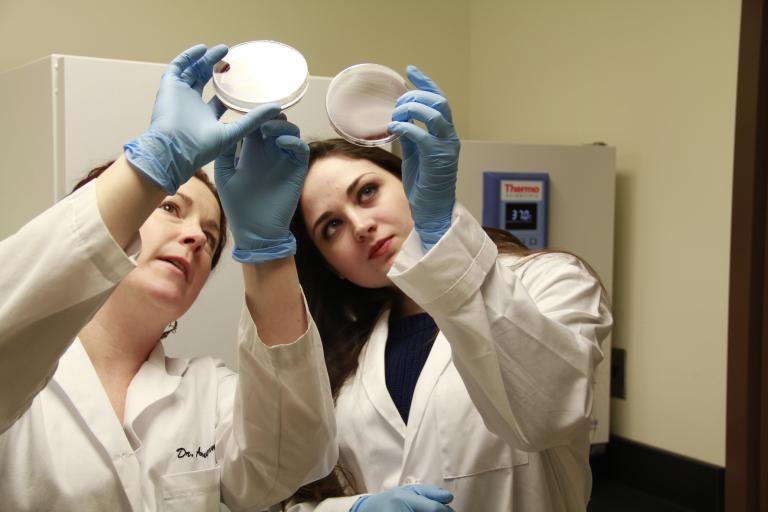
“At other universities, biology is a popular program that attracts all sorts of people with different goals and backgrounds. I didn’t want to just become a number within that crowd.”
Student Elyse Hossink is not only getting a unique opportunity to engage in full-time research as a freshman, her contributions could potentially lead to future publication and even funding opportunities.
Hossink, an Applied Biology major from Whitehall, Michigan, chose to attend Kettering University in hopes of gaining unique opportunities. As one of the first two Bell-Kagle Interns, that’s precisely what she’s found.
“What brought me here over other schools was that I knew at Kettering I would have a unique experience,” she said. “At other universities, biology is a popular program that attracts all sorts of people with different goals and backgrounds. I didn’t want to just become a number within that crowd. At Kettering, I can get to know my professors easily and receive advice and guidance on a personal level.”
Dr. Cheryl Samaniego
Hossink’s co-op position is through the new Bell-Kagle Internship program at Kettering. Created with the support of alumnus Bob Kagle ’78, the program was conceived in honor of G. Reginald Bell, longtime Chemistry professor at Kettering, to create paid, full-time research co-op positions for students majoring in Applied Biology, Chemistry and Bio-Chemistry. The program not only helps students in those majors find appropriate co-op employment, it also gives faculty added resources to conduct meaningful applied research on campus.
Hossink is working with Dr. Michelle Ammerman and Dr. Cheryl Samaniego, faculty members in Applied Biology, on research determining medicinal properties of plant extracts. The research includes examining antimicrobial properties of plant extracts by exposing numerous bacterial strains to them and analyzing the effects.
The complexity of the research includes contributions from a wide range of faculty, including Dr. Jonathan Wenzel in Chemical Engineering and Dr. Lihua Wang and Dr. Ali Zand from Chemistry/Biochemistry. The collaboration between so many academic departments is giving Hossink broad exposure to a wide range of academic programs.
“This is a collaborative project that involves more than biology,” Ammerman said. “The collaboration between academic departments is giving Elyse valuable exposure to many different disciplines.”
In addition to the collaborative experiences, Hossink has already gained several skills since starting as a Bell-Kagle Intern in January. She’s learned tests to do cellular analysis, learned how to pipette, set up dilutions, used different lab instrumentation, worked on mammalian cell culture techniques and learned how to handle different bacterial cells, including pathogens, among other responsibilities.
“This type of experience is unheard of at the freshman level,” Samaniego said. “At most universities, things like cell culture and the types of experiments she is doing are restricted to seniors or graduate students. She’s being introduced to the literature of the field, learning the hows and whys of each step and it really is giving her a leg up on students at other universities.”
Hossink notes that she’s most interested in topics involving microbiology and hopes to someday study virology in graduate school. The ability to engage in lab work right away was a major factor in her decision to choose Kettering.
“At Kettering, I am allowed to do research even though I’m only 18-years-old and have no previous experience,” Hossink said. “So far it has been both an enjoyable and great learning experience. The professors that I work with are more than just advisers to me on the project, they have become my mentors and have been teaching me important skills and information, as well as inside tips and tricks of the trade. I have learned more in my co-op then I could ever hope to learn from a textbook or lecture and I believe that this will give me a great advantage as I continue on my educational journey.”
Hossink’s ambition and eagerness to learn new skills has proven a valuable asset for the faculty she’s working with as well.
“Elyse is extremely hard working -- she even watches TED Talks on subjects she’s interested in learning more about in her spare time,” Ammerman said. “By the time she’s done working on this project, we’ll be close to getting a paper published and her name will be on it. Being published as an undergraduate is a huge achievement, and something that will help a lot as she looks at graduate schools.”
(Left to right) Elyse Hossink, Professor Reg Bell, Dr. Michelle Ammerman, Dr. Cheryl Samaniego.